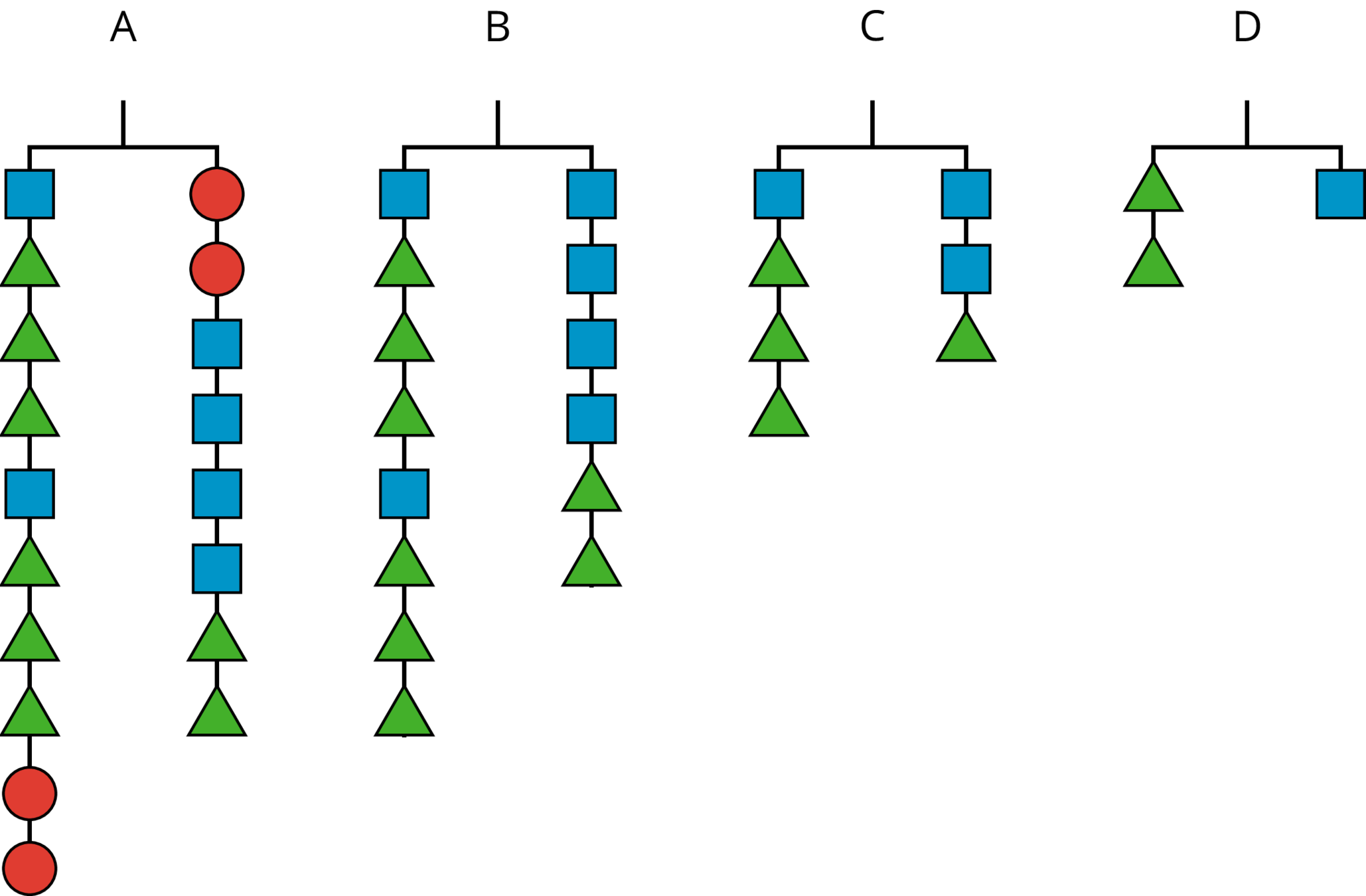Lesson 12
Balanced Moves
Let's rewrite equations while keeping the same solutions.
12.1: Matching Hangers
Figures A, B, C, and D show the result of simplifying the hanger in Figure A by removing equal weights from each side.

Here are some equations. Each equation represents one of the hanger diagrams.
\(2(x + 3y) = 4x + 2y\)
\(2y = x\)
\(2(x + 3y) + 2z = 2z + 4x + 2y\)
\(x + 3y = 2x + y\)
-
Write the equation that goes with each figure:
A:
B:
C:
D:
- Each variable (\(x\), \(y\), and \(z\)) represents the weight of one shape. Which goes with which?
- Explain what was done to each equation to create the next equation. If you get stuck, think about how the hangers changed.
12.2: Matching Equation Moves
Your teacher will give you some cards. Each of the cards 1 through 6 show two equations. Each of the cards A through E describe a move that turns one equation into another.
- Match each number card with a letter card.
- One of the letter cards will not have a match. For this card, write two equations showing the described move.
12.3: Keeping Equality
- Noah and Lin both solved the equation \(14a=2(a-3)\).
Do you agree with either of them? Why?
Noah's solution:
\(\begin{align*} 14a&=2(a-3) \\ 14a&=2a-6 \\ 12a&=\text-6 \\ a&=\text-\frac12 \\ \end{align*}\)
Lin's solution:
\(\begin{align} 14a&=2(a-3) \\ 7a&=a-3\\ 6a&=\text-3\\a&=\text-\frac12 \end{align}\)
- Elena is asked to solve \(15 - 10x = 5(x + 9)\). What do you recommend she does to each side first?
- Diego is asked to solve \(3x -8 = 4(x + 5)\). What do you recommend he does to each side first?
In a cryptarithmetic puzzle, the digits 0–9 are represented with letters of the alphabet. Use your understanding of addition to find which digits go with the letters A, B, E, G, H, L, N, and R.
HANGER + HANGER + HANGER = ALGEBRA
Summary
An equation tells us that two expressions have equal value. For example, if \(4x+9\) and \(\text-2x-3\) have equal value, we can write the equation
\(4x + 9 = \text-2x - 3\)
Earlier, we used hangers to understand that if we add the same positive number to each side of the equation, the sides will still have equal value. It also works if we add negative numbers! For example, we can add -9 to each side of the equation.
\(\begin{align} 4x+9+\text-9 &= \text-2x-3+\text-9 &&\text{add \(\text-9\) to each side}\\ 4x &= \text-2x-12 && \text{combine like terms} \end{align}\)
Since expressions represent numbers, we can also add expressions to each side of an equation. For example, we can add \(2x\) to each side and still maintain equality.
\(\begin{align} 4x+2x &= \text-2x-12 +2x && \text{add \(2x\) to each side} \\ 6x &= \text-12 && \text{combine like terms} \end{align}\)
If we multiply or divide the expressions on each side of an equation by the same number, we will also maintain the equality (so long as we do not divide by zero).
\(\begin{align} 6x\boldcdot \frac16=\text-12\boldcdot \frac16 && \text{multiply each side by }\frac16 \end{align}\)
or
\(\begin{align} 6x\div6=\text-12\div6 && \text{divide each side by 6} \end{align}\)
Now we can see that \(x = \text-2\) is the solution to our equation.
We will use these moves in systematic ways to solve equations in future lessons.